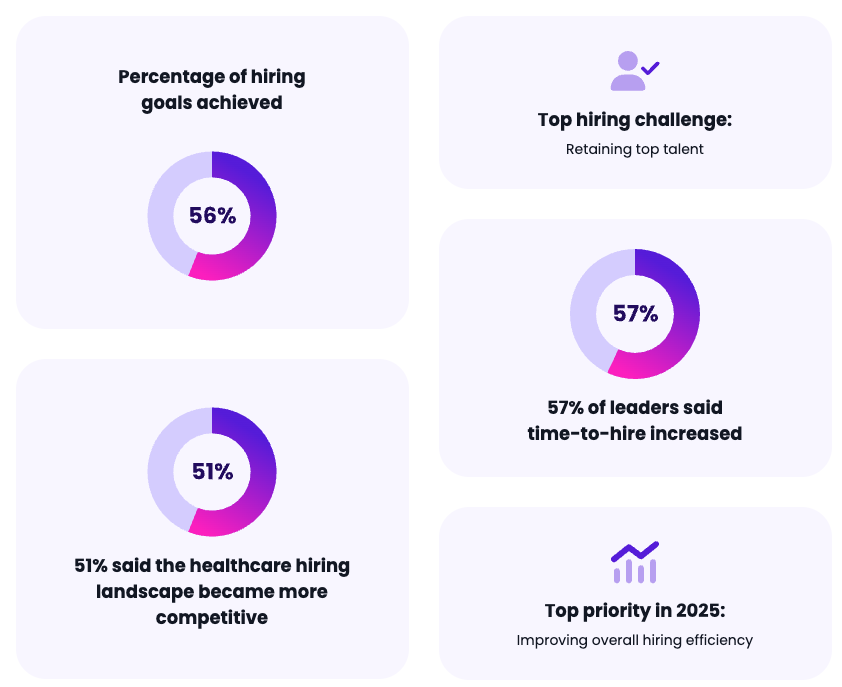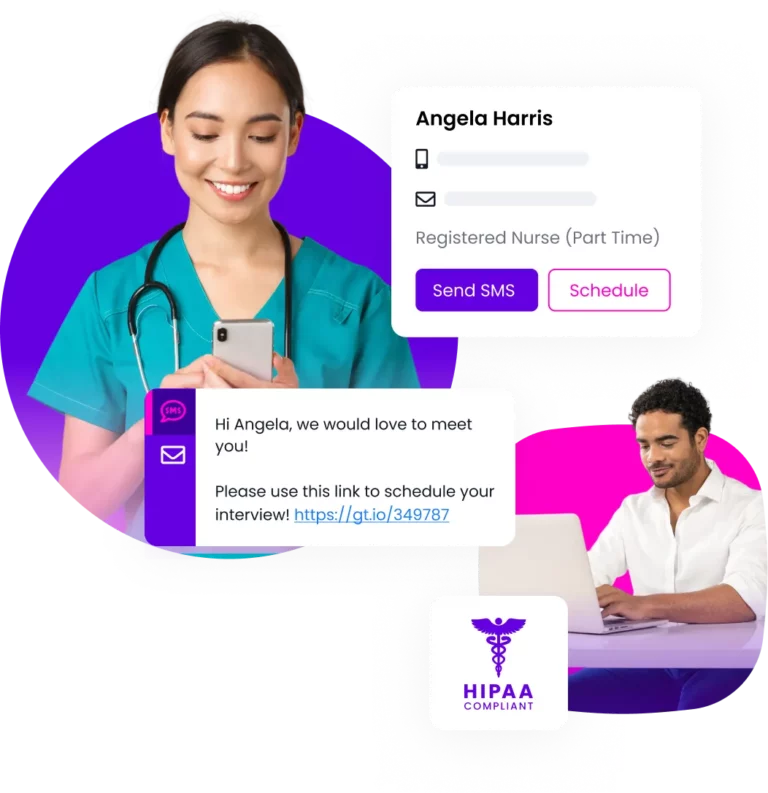Editor’s note: The article below is an excerpt from GoodTime’s 2025 Hiring Insights Report. The entire report is available to view online for free here.
Healthcare hiring last year was defined by urgent demand, mounting pressures, and high stakes. The industry’s ongoing talent shortage collided with growing provider burnout and turnover, leaving TA leaders struggling to maintain workforce levels essential to patient care. Meanwhile, candidates, aware of their value in such a constrained labor market, demanded faster, more transparent hiring processes and a seamless experience. These challenges, combined with unmanageable workloads for recruiters and hiring managers, created a perfect storm for healthcare TA teams.
Despite these hurdles, healthcare organizations took important steps forward by embracing healthcare recruiting software, improving candidate engagement, and streamlining processes. Yet, persistent bottlenecks—like untrained interviewers, scheduling inefficiencies, and slow decision-making—continued to hamper progress. This section of our report examines how these factors reshaped healthcare hiring strategies, driving a shift toward innovation while exposing areas still in need of attention.
As the sector looks to 2025, healthcare TA leaders have an opportunity to transform their approach to hiring. By prioritizing operational efficiency, leveraging automation, and fostering meaningful candidate relationships, the industry can begin to alleviate workforce shortages and build more sustainable hiring practices. Let’s look at current healthcare hiring trends and stats, and the strategies healthcare leaders can deploy to address the challenges ahead.

Unlock healthcare’s top hiring strategies in 2025
Our study of 105 healthcare TA leaders reveals how to hit your hiring goals in a challenging market.

Executive summary: Key healthcare hiring trends for 2025

- 56% of hiring goals were achieved.
- 57% of leaders reported an increase in time-to-hire.
- 51% said the healthcare hiring landscape became more competitive.
- Top hiring challenge: Retaining top talent.
- Top priority for 2025: Improving overall hiring efficiency.
Looking back at 2024: Healthcare hiring jolts forward in the face of major challenges
The healthcare sector made measurable progress in 2024, achieving 56% of its hiring goals—a significant improvement from 46% in 2023. However, hiring leaders faced numerous challenges that reflect the unique pressures of the industry.
Retaining top talent emerged as the most critical issue, impacting 39% of organizations, while candidates’ preference for fully remote work added complexity to already strained recruitment efforts. A persistent shortage of qualified candidates further hindered the ability to fill vital roles.
Operational inefficiencies added to these difficulties, with organizations citing challenges such as adapting to hybrid or remote interview processes, managing large applicant volumes, and navigating outdated hiring technology. Candidate no-shows and dropouts—often tied to poor communication or lack of engagement—disrupted hiring timelines, while untrained hiring managers further slowed progress.
These challenges illustrate the steep hurdles healthcare organizations continue to face in a landscape defined by workforce shortages and high burnout. Despite improvements in hiring outcomes, 2024 emphasized the pressing need for healthcare leaders to adopt innovative solutions that address these unique challenges and ensure more sustainable progress.
Time-to-hire challenges continue to strain healthcare hiring amid provider shortages
In 2024, 57% of healthcare hiring leaders reported an increase in time-to-hire, highlighting persistent inefficiencies in meeting the demand for qualified providers
A lack of qualified candidates (47%) topped the list of challenges, followed closely by untrained or underprepared interviewers (44%) and frequent interview cancellations or reschedules (41%).
Delays in decision-making by hiring managers and poor communication with candidates further slowed hiring cycles, contributing to candidate withdrawals and disengagement. Addressing these bottlenecks will require healthcare organizations to streamline workflows, improve interviewer training, and implement tools that enable faster, more effective decision-making to compete for top talent.
In 2024, the healthcare hiring landscape grew increasingly competitive, with 51% of leaders citing rising demand for talent as a major challenge. High recruitment team turnover (50%) and growing candidate demands (45%) added further complexity, increasing the touchpoints needed to keep candidates engaged. The ability to connect with candidates quickly and create meaningful relationships became more critical than ever, as slow processes and a lack of personalization risked higher dropout rates.
How healthcare tackled hiring challenges in 2024
In response to persistent hiring challenges, healthcare organizations in 2024 focused on key improvements to boost efficiency and candidate engagement. Increasing offer acceptance rates (46%) was a top priority, reflecting the need to secure candidates quickly in a highly competitive market.
Efforts to improve the candidate experience (41%) and personalize the hiring process (40%) further demonstrated the sector’s focus on creating a seamless and engaging journey for applicants.
Organizations also prioritized time-to-hire (40%) and cost-per-hire (39%) improvements, recognizing that speed and cost efficiency are critical to staying competitive in a constrained labor market. Investments in AI and automation (37%) played a growing role in streamlining scheduling and reducing administrative burdens, while a smaller percentage (23%) began upgrading hiring technologies to modernize processes.
While technology upgrades ranked lower on the list of focus areas (23%), the data suggests that teams may be underutilizing hiring technology as a solution to some of their top challenges. Investing in the right tools—particularly those that streamline scheduling and reduce administrative tasks—could help address persistent bottlenecks like time-to-hire, cost efficiency, and candidate engagement.
Looking at specific applications of AI and automation in healthcare hiring, we see that leaders are increasingly using AI chatbots to engage with and respond to candidates quickly. They’re also leveraging AI to help with administrative tasks like resume screening and interview scheduling software, as well as to deliver analytics and insights to help them continuously improve their hiring practices over time.
Building a fast and simple recruiting process for candidates
In 2024, healthcare organizations focused on simplifying the hiring process, with improved scheduling efficiency (54%) and fast interview-to-offer timelines (52%) topping the list of priorities.
Tools to enhance the candidate experience and provide transparency in the process further helped streamline hiring and boost engagement.
By enabling automated scheduling and offering flexibility, such as rescheduling through platforms (47%), organizations reduced friction and created a more candidate-friendly process.
How healthcare hiring teams measure success
In 2024, healthcare organizations prioritized recruitment metrics focused on retention and hiring efficiency, with employee turnover rate (53%) and quality of hire (46%) leading the way. Metrics like offer acceptance rate (43%) and cost-per-hire (42%) highlighted the focus on operational efficiency, while diversity of candidates (38%) and time-to-hire (37%) reflected priorities around balancing equity and speed.
However, less frequent tracking of candidate experience metrics (28%) points to an opportunity for teams to better integrate candidate-focused insights into their hiring processes.
How healthcare talent leaders are gearing up for 2025
Healthcare hiring leaders anticipate significant shifts in 2025, with 51% expecting recruitment team turnover to further disrupt candidate flow management.
Interestingly, 47% believe the hiring landscape will become less competitive due to an increase in available talent, despite the ongoing shortage of qualified providers3. This contradiction may stem from a broader pool of job seekers entering the market, but not all candidates may meet the specific qualifications required in the healthcare industry. As a result, while talent availability may rise, the demand for highly specialized, credentialed professionals will likely remain a critical challenge.
Growing candidate demands and the importance of building meaningful relationships with candidates (both 45%) are also predicted to shape hiring strategies.
Key challenges for 2025 include retaining top talent (34%), mismatched skills among applicants (32%), and unmanageable workloads for recruiting teams (27%). Candidate dropouts and difficulties adapting to hybrid interview processes are expected to persist, adding further complexity. Addressing these challenges will require healthcare organizations to refine their hiring processes and invest in tools that support speed, personalization, and flexibility, while also focusing on retaining skilled workers in an increasingly demanding landscape.
Healthcare leaders prioritize efficiency above all else in 2025
Healthcare leaders are prioritizing efficiency and candidate experience in 2025, with 40% aiming to improve overall hiring processes and 38% focusing on enhancing the candidate journey.
Upgrading hiring technology (35%) and utilizing AI to streamline operations (34%) have also moved higher on the agenda, reflecting a stronger push toward modernizing workflows and addressing key inefficiencies. Notably, upgrading technology was among the lower priorities for healthcare teams in 2024, but its increased focus this year signals a growing recognition of its critical role in solving persistent hiring challenges.
Investments in technology will play a central role in these efforts, with 93% of leaders indicating they are likely or very likely to invest in additional tools to boost hiring efficiency. These plans underscore the sector’s focus on leveraging technology to personalize hiring, reduce costs, and improve decision-making. By addressing these priorities, healthcare organizations are better positioned to navigate the growing complexity of the talent market and meet workforce demands in 2025.
Final thoughts and key takeaways
This year, healthcare hiring teams faced immense challenges, from a shortage of qualified providers to extended time-to-hire and inefficiencies in hiring processes. As demand for healthcare talent surged, the sector increasingly turned to technology and automation to streamline workflows and improve the candidate experience. However, challenges such as high recruitment team turnover, unmanageable workloads, and growing candidate demands highlighted the need for continued innovation and adaptability.
Looking ahead to 2025, healthcare leaders should prioritize:
- Investing in hiring technology: Upgrading tools to optimize workflows, improve scheduling, and enhance communication will be crucial for reducing time-to-hire and increasing operational efficiency.
- Enhancing candidate engagement: Personalization, transparency, and fast hiring processes will help attract and retain top talent in an increasingly competitive market.
- Building recruiter and hiring manager capacity: Providing training and leveraging automation can ease the burden on recruitment teams, enabling them to manage workflows more effectively while maintaining high hiring standards.
- Tracking meaningful metrics: Expanding the focus on candidate experience metrics alongside efficiency measures like time-to-hire will provide actionable insights to refine processes and remain competitive.
Go beyond bandaid solutions to hit your healthcare hiring goals consistently
Automate your healthcare hiring process, increase candidate engagement rates, and fill open roles 50% faster.





